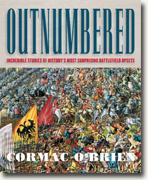Outnumbered
Cormac O'Brien
book reviews:
· general fiction
· chick lit/romance
· sci-fi/fantasy
· graphic novels
· nonfiction
· audio books
· author interviews
· children's books @
curledupkids.com
· DVD reviews @
curledupdvd.com
newsletter
win books
buy online
links
home
for authors
& publishers
for reviewers

 |
Outnumbered: Incredible Stories of History's Most Surprising Battlefield Upsets Cormac O'Brien Fair Winds Press Paperback 304 pages May 2010 |
|
This large format, colorful paperback book about overcoming the odds is extensively researched and beautifully illustrated with maps and illustrations, photographs (where relevant) and paintings of the events described. Author Cormac O'Brien has written many popular books on historical subjects, such as Secret Lives of the US Presidents and The Forgotten History of America, and is a presenter on NPR. The title and subtitle of this book tell its content. Fourteen battles are detailed as well as can be known from sometimes ancient documents and reports. All involve victory by a small number of combatants against a markedly larger force, sometimes superior in obvious ways over their ultimate conquerors.
This day is call'd the feast of Crispian.Of course, Shakespeare was writing 200 years after the fact, and no one knows what if anything Henry V said that day, but it is known that he led and fought alongside his small ragged “band of brothers” – men of all social classes who had been on the march in near-starvation conditions for weeks prior to St Crispin’s Day, many of them suffering from the ravages of dysentery – in one of the decisive battles of the Hundred Years' War. O’Brien offers this vignette: “Those Frenchmen may well have smelled the English coming long before they saw them. Even as they were wracked by dysentery and deprived of proper food, Henry’s men had been ordered to remain in a state of readiness on the march for fear of imminent battle. This meant that men-at-arms accustomed to riding with their kit in tow now rode fully armored in the saddle for days – weeks – at a stretch, trapping their suffering bodies in a kind of prison. Under the rain, corrosion began to appear where normal care had become impossible, allowing rusty water to creep into clothes and over flesh that had grown mephitic from neglect. The stench must have been insufferable.”It is these minute details that make this book so readable, even for those who are unfamiliar with the particular conflicts described. The English at Agincourt had three things on their side: excellent leadership; the longbow, a fearsome weapon whose use they had been perfecting for a generation or more; and an indomitable will that had been growing, not diminishing, during their frustrating march. The French were arrogant, their leadership scattered and unprepared for real resistance, making the assumption that mere force of numbers would carry the day. Using the longbows, shooting from the woods where the French battle tactics were nearly useless, and setting up deadly wooden stakes to overturn the charging cavalry, the English forces stood firm, obeyed orders, and killed with savage glee. Other battles included in the book include classics like Salamis and Cannae; the Civil War confrontation at Chancellorsville; Rorke’s Drift; and the battle for control of Singapore in 1942. O’Brien sagely comments that both luck and tactics play a role in who wins and who loses: “Battle is the (often futile) act of finding order in chaos, an unavoidable fact that underpins everything in the hellish, murderous confusion of mass killing.” Originally published on Curled Up With A Good Book at www.curledup.com. © Barbara Bamberger Scott, 2010 |
|
|
|
 Click here to learn more about this month's sponsor! |
|
| fiction · sf/f · comic books · nonfiction · audio newsletter · free book contest · buy books online review index · links · · authors & publishers reviewers |
|
| site by ELBO Computing Resources, Inc. | |
 An example is the Battle of Agincourt. Shakespeare focused on this in his play
Henry V in a moving and oft-quoted speech:
An example is the Battle of Agincourt. Shakespeare focused on this in his play
Henry V in a moving and oft-quoted speech: